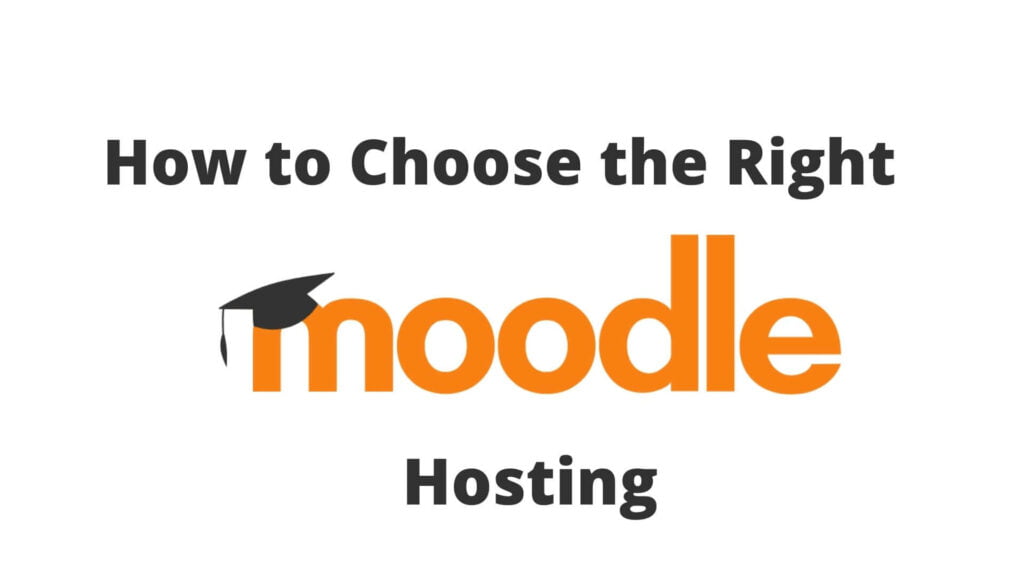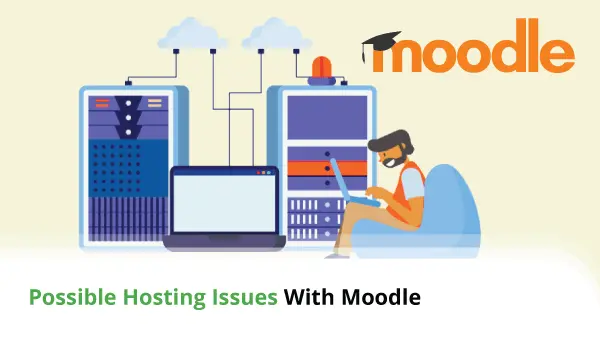
Global trends have seen the rise of eLearning and its associated tools. If you’re an educator or simply wish to tap on to the curve, Moodle LMS is a great choice. As with everything that’s web-based though, you will need to have the right web hosting partner to run things smoothly.
Table of contents:
- What is Moodle LMS?
- Challenges Faced by Moodle LMS Site Owners
- Types of Website Hosting Solutions
- What is Moodle Hosting?
- Why is Other Hosting Not An Option?
- Criteria to Choose Moodle Hosting
- Tips to Get a Good Moodle LMS Hosting Provider
- Final Thoughts
- Frequently Asked Questions
What is Moodle LMS?
The Moodle Learning Management System (LMS) is an open source platform developed as a tool to aid distance learning. First released by Martin Dougiamas in August 2002, it was meant to be an experiment of sorts and quickly rolled on from that point.
For those curious about the name, Moodle actually represents “modular object-oriented dynamic learning environment”. That, along with the literal meaning of insight, or creativity, made it the perfect acronym for the platform.
Over the years, Moodle LMS has developed steadily through incremental revisions. The current stable release of Moodle is version 3.10, released very recently.
Challenges Faced by Moodle LMS Site Owners
Being a web-based application, Moodle LMS faces many of the common challenges typical to these platforms.
For example:
Storage Limits
Content on Moodle LMS platforms is often user-generated and needs a good amount of space to grow. Taking into account the high likelihood of multimedia content for eLearning materials, Moodle LMS sites often need generous amounts of storage space.
Slow Performance
Unless the Moodle site gets literally no traffic, even a medium flow of users on the Moodle LMS site can face significant speed performance issues. Part of this is caused by the necessity of working with a database in order to create a dynamic environment for users.
Server Management
Since Moodle sites often require better hosting plans to operate smoothly, one potential problem arises when it comes to managing the hosting server. For those opting to host their Moodle site locally (on-premise self hosting), this can be a very significant barrier in both cost and technical areas.
No Scalability
If you’re running a Moodle site and feel as if there’s no room to grow, you might not be wrong. Choosing the wrong type of Moodle hosting can not only impact performance, but also severely limit the potential of your site.
Types of Website Hosting Solutions
Going back to basics, we know that there are three major categories of web hosting – shared hosting, Virtual Private Server (VPS), and dedicated hosting. Each of these has their own advantages, but not all may be suitable for hosting Moodle LMS sites.
Shared Hosting
Typically the first type of web hosting that all users come across is shared hosting. Shared hosting places hundreds of user accounts on a single server and lets them share the resources of that server.
Because of this, shared hosting is often low-cost, but can cause serious bottlenecks when it comes to resource needs. If all resources are currently occupied, your site will simply have to wait its turn.
Virtual Private Server
VPS hosting is the atypical middle ground of web hosting. Although multiple accounts still reside on each server, VPS plans offer dedicated resources that are available on demand. They are also typically more secure given the isolated nature of these accounts created via virtualization technology.
Dedicated Hosting
As the name implies, in dedicated hosting you get an entire server to yourself. Every resource and ounce of performance belongs to your site alone. However, such power comes with a steep price tag which you will have to bear by yourself.
What is Moodle Hosting?
If you’ve heard of WordPress hosting or Drupal hosting, Moodle hosting is similar in nature. Products like ScalaHosting Moodle hosting have to offer are designed specifically to optimize environments for this platform.
ScalaHosting’s Moodle hosting stretches across a variety of hosting types, from shared to VPS accounts. Of course, given the nature of the platform, ScalaHosting does recommend that you opt for VPS plans for Moodle sites.
Why is Other Hosting Not An Option?
A core part of the reason why ScalaHosting recommends VPS for Moodle sites is simply due to the nature of the platform. Most LMS often need to cater to multiple concurrent users, meaning that many people will be using it at the same time.
In order for the LMS to adequately handle serving content to this group, more resources are often needed – and for longer durations at a time. The dedicated resources that ScalaHosting Moodle VPS plans offer can do that, along with offering the potential to scale up as needed.
Criteria to Choose Moodle Hosting
There are many areas you need to pay attention to when looking for your perfect Moodle hosting plan. Aside from many of the usual web hosting considerations, Moodle site owners can also expect to need a focus on:
Major Security Issues
Since your Moodle site will be handling personal information and possibly even payment processing, security has to be a priority. ScalaHosting Moodle hosting plans come with SShield protection, guarding accounts in real-time against cyberthreats.
Inefficient Performance
Not all web hosting services are equal. Web servers owned by ScalaHosting are supported by expert staff dedicated to their roles. This promises users the ultimate in high efficiency performance so your Moodle site will run smoothly and serve your budding eLearners well.
Frequent Downtime
If you’re going to host a Moodle eLearning site, you have to ensure that it’s available 24/7. Some students may have a very small window of time during which they can learn, so the hosting partner you choose needs to be reliable.
Unmanaged Vs Managed Moodle Hosting
If you’ve opted for hosting Moodle on VPS or dedicated server plans, another question comes into play – managed or unmanaged hosting. As powerful as these plans may be, choosing an unmanaged option could mean lots of time spent in maintenance and configuration instead of improving your eLearning platform.
Managed Moodle hosting means that the web host will take on the responsibility for configuring and maintaining the perfect hosting environment for you. This means that you will be free to focus on simply building your Moodle site.
Courses, Types, and Languages
This is important because they govern two main areas. The first is simply by volume of content – the more you have, the more space you’ll need to store it. By implication, high content volume and quality also typically attracts more students so you’ll need the web hosting power to handle that volume of traffic.
What’s the Traffic Behavior Like?
Knowing how your students behave on your site, or even anticipating that can be helpful. Different features of Moodle sites require different amounts of resources to handle. By estimating how your visitors may behave, you can plan ahead for what resources you might need.
Where’s Your Traffic Mainly From?
Localization is a word even for eLearning platforms. This is meant more literally, since physical distance from a web server can affect site speed for visitors. If you know where your targeted traffic mainly originates from, opt for a server nearer to their location to improve your Moodle site performance.
Moodle LMS Hosting Requirements
In terms of hardware alone, you’ll need 200MB just for the Moodle code. It’s also recommended to provision for at least a dual core processor and a minimum of 512MB of memory. The higher your traffic volume, the more most of these basic requirements will increase.
Secure Sockets Layer
Earlier we spoke about the security needed for handling personal and payment processing information and Secure Sockets Layer (SSL) is another element of that. SSL helps to ensure all data sent between your Moodle site and its visitors is encrypted and safe.
Aside from security, SSL is an area that search engines like Google focus on. These search giants want to direct visitors to sites which are safe – so they keep an eye on your SSL certification status.
Tips to Get a Good Moodle LMS Hosting Provider
- Know Your requirements – Moodle itself is a very simple platform, it’s up to you, the user, to decide how complex or vibrantly it presents itself. Knowing the features you want to implement can go a long way in guiding your hosting decision.
- Gauge the host performance – There are lots of review sites that discuss specifics on web hosting performance. Most of these are snapshot reviews of course, but some sites that track web hosting server performance do exist.
- Read the forums – Nothing is better than feedback from other users, so read what people are saying about the host. Do be cautious about this though since you have to keep in mind that some hosts support many customers, only a few of whom will complain loudly.
Final Thoughts
Moodle is a very unique platform and as trends heading the way they are – offer users a fantastic opportunity. More importantly than realizing that is the fact that you need to do your research before establishing your Moodle site.
By doing the right background work you can ensure that you will create the perfect eLearning environment for your students, keeping them happy and your satisfied with the results.
Frequently Asked Questions
Is Moodle LMS free?
Yes, Moodle is open source and available for free to install on your choice of web hosting provider. The Moodle site also offers hosting with Moodle ready to use, but that option is relatively expensive, starting from a minimum of $80AUD per year.
How do I use Moodle?
Before setting it up, knowing the Moodle platform can be very useful. Once you are aware of the Moodle experience, find a web host to install it on and simply start configuring and creating the framework and content for your Moodle site.
Who uses the Moodle platform?
There are several big brands who currently use Moodle as an eLearning tool. Some examples of these include Microsoft, Allianz, World Vision, and Coca-cola. They vary greatly in industry since learning is pretty much a borderless thing.
Is Moodle safe?
Like any other web-based application, a large part of Moodle security will depend on the user and web hosting provider. Choose a secure web hosting provider like ScalaHosting for the best Moodle site security.
How good is Moodle?
Moodle has been acknowledged as one of the best eLearning platforms around. This is evidenced by the many top brands in the world who use it as part of their distance learning platforms, be it internal or external.



